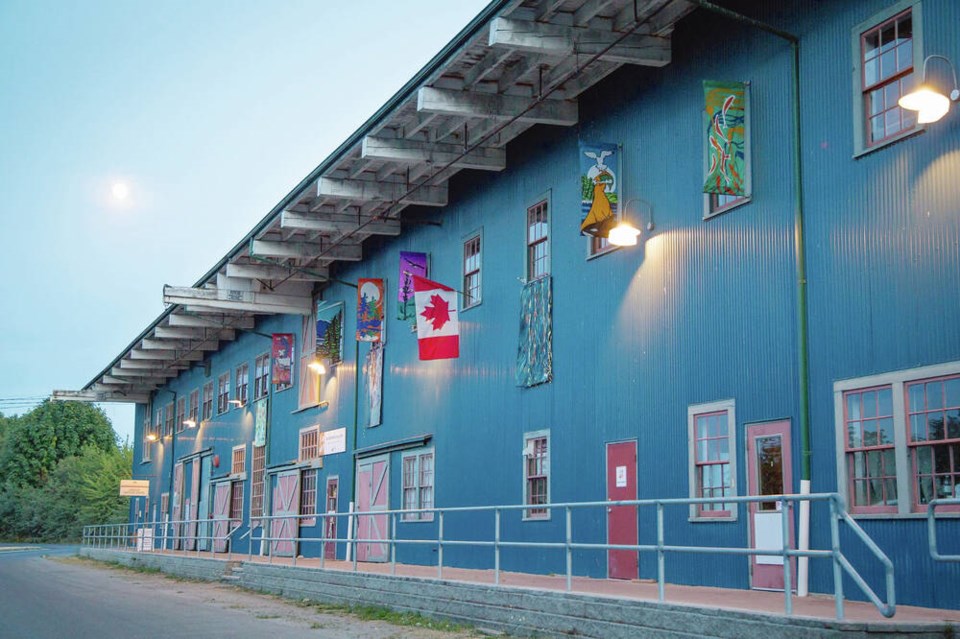Ladysmith’s historic machine shop is set for a significant upgrade as the town moves forward with plans for a waterfront arts and heritage hub that the 1943 building is expected to anchor.
Revitalizing the distinctive blue building on Oyster Bay Drive “will be a huge win for the town and for anybody who visits and lives there,” Ladysmith Mayor Aaron Stone said in an interview. “It’s a super-exciting opportunity.”
The revamped building, used until 2019 as an art gallery, with studio spaces for artists, a museum, and classroom space for the arts, is expected to open before the spring of 2026.
A request for proposals for a project construction manager will be issued this month, the town said.
The plan is for a variety of spaces to attract people to the area, including artist studios set up for long-term rental, an indoor display area for public art and cultural installations, public meeting space, and a multipurpose teaching space equipped with a sink.
New windows will run across the front of the building, making it more energy-efficient and lowering costs for tenants.
A 200-foot-long accessible boardwalk will be constructed along the side of the building facing the water.
A small amphitheatre at the south end of the building will “really open up programming opportunities” for the arts and heritage hub, Stone said.
The plan reflects a change in the order of development on the property as the town of about 9,000 looks to the future.
The federal government gave the town $3.3 million in 2020 through its Investing in Canada Infrastructure Program to build a new studio for artists, but bids came in at 67 per cent above budget, putting it out of reach financially. “It was a big disappointment,” Stone said.
Public and private construction projects have experienced spiralling costs in recent years due to inflation, high interest rates, and the increasing cost of materials.
The proposal had come out of the town’s arts and heritage hub design steering committee, with guidance from Stz’uminus elders who had collaborated with an architectural firm for more than a year to finalize a studio design.
After consultation with the funders, a more affordable plan was approved that set aside the arts studio for now and devoted the funding to renovating part of the machine shop, which has already had seismic work done.
A total of 3,900 square feet on the waterfront side of the machine shop will be reworked, leaving the portion of the building facing the highway to the west as is for now.
After the machine shop is renovated, the town will work on the bigger plan for the arts and culture hub “as opportunities arise,” the mayor said.
The town still has most of the $3.3-million grant from the federal government, although some went toward design work for the artists studio, said Stone, adding the money wasn’t wasted, since it will allow the town to submit applications with a ready-to-go design for the studio if it ever goes ahead.
Originally constructed by the Comox Logging and Railway Company for working on equipment, the heritage-registered building is listed in Canada’s Historic Places website, where it’s described as a “very rare, intact remnant of the community’s industrial logging past.”
Ladysmith fell into a severe economic slump after the local coal mines closed in 1931, but was revived after the logging company “embarked on a new logging effort,” Canada’s Historic Places said.
“The building stands as a tangible reminder of the pivotal role the Comox Logging and Railway Company played in Ladysmith and as a symbol of the post-mining economy.”
Ladysmith’s waterfront plan, which has been in the works for several years, includes a mix of housing, live-work spaces, marine services, a commercial fishing wharf, and a boutique hotel.
The Stz’uiminus Nation, which took over the community marina at the start of this year, renaming it Oyster Bay Marina, is hoping to take part in a development resulting in a mini-Granville Island-style hub.
“I’d like to see us make substantial progress in the next few years,” Stone said.
>>> To comment on this article, write a letter to the editor: [email protected]




